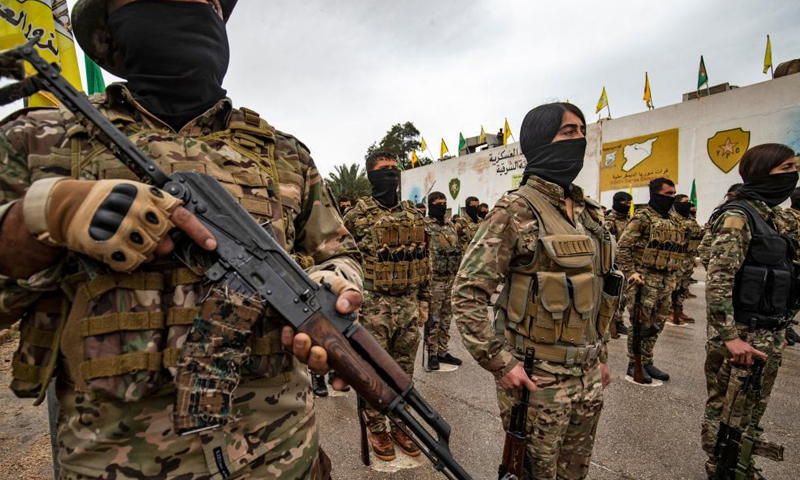Enab Baladi – Ali Darwish
The forced recruitment imposed by the Autonomous Administration of North and East Syria (AANES) has topped the challenges faced by Arab and Kurdish residents throughout the northeast region, leading to popular protests, particularly in areas of Arab majority.
During protests against compulsory military service in some cities and towns of al-Raqqa and Deir Ezzor governorate, the Syrian Democratic Forces (SDF) and the Internal Security Forces (ISF), also known as Asayesh, claimed the lives and injured several protestors.
Despite human losses and injuries in Deir Ezzor and al-Raqqa and continued popular pressure, the AANES did not respond to any demands for abolishing forced recruitment or exempting certain groups such as health and education professionals from military service.
In Manbij, however, the compulsory recruitment campaign was suspended, and the issue was referred to “competent authorities” to review the law, according to a joint statement by the Military Council of Manbij city and its countryside east of Aleppo, AANES, and the dignitaries and elders of Manbij on 24 June.
The SDF acceded to popular demands in Manbij, why?
Political researcher Hassan al-Nifi from Manbij told Enab Baladi that the strategic importance of Manbij had forced the SDF to respond to popular demands hoping to contain the protests and hamper the efforts of outside forces wishing to control the city.
Manbij is the only city located to the west of the Euphrates River controlled by the SDF and surrounded by military forces of other parties.
The Turkey-backed Syrian National Army (SNA) is situated on the northwestern side of the city, making contact points between the SNA and the SDF close.
Meanwhile, the regime forces are deployed on the city’s southern and western sides, 15 kilometers to the south and 20 kilometers to the west.
Manbij city’s particularity is not limited to its geographical significance but the zealous popular movement in the city and the countryside alike. Once protesters took the streets of the city, the countryside witnessed a similar momentum.
The protests were somehow organized. Arab clans coordinated with the protests’ organizers to achieve “coherence,” al-Nifi said.
Political researcher at Jusoor for Studies Center, Anas Shawakh, pointed out that Manbij is a special case in the forced recruitment application matter, unlike the rest of the AANES-controlled areas.
The SDF had previously tried to enforce compulsory military service in Manbij but was met with a general strike in the city.
Shawakh added that Manbij falls under special regional calculations. For example, the United States has pledged to withdraw the Kurdistan Workers’ Party (PKK) elements from the city after it had been recaptured from the Islamic State (IS); however, the SDF did nothing to help realize this pledge.
At the domestic level, considerable numbers of the city residents are members of the SDF’s Military Council in Manbij. The Council’s elements are mostly former fighters in the Free Syrian Army, prompting the SDF to anticipate in fear a possible dissent from the Council.
Backed by the International Coalition Forces (ICF), the SDF took control of Manbij in August 2016, driving Turkey to announce its intention to expel the SDF fighters from the city.
In March 2017, Turkey’s Former Defense Minister, Fikri Işık, stated that “Turkey’s priority is to liberate Manbij, and we expect the international coalition, mainly the US, to keep its promises.”
Işık added, “Turkey is waiting for the Democratic Union Party (PYD) and the PKK elements to withdraw from the west of the Euphrates River. This is what the US has promised Turkey, and we await the fulfillment of this promise as soon as possible.”
The SDF’s fear of the impact of its decision in Manbij
“The protests in Manbij and the SDF’s acceding to residents’ demands would encourage the rest of the SDF regions’ population to express their indignation, put forth demands, and protest against any of the SDF policies and decisions,” Shawakh said adding, “What happened in Manbij is promising despite the unfortunate deaths.”
He added, “The SDF realizes the implications of its decision in Manbij, and that is why it hesitated to accede to demands and tried to stall on its decision. In fact, we are not assured of the SDF’s seriousness, as it did not cancel or amend the forced recruitment law but only suspended it.”
Since 2014, the SDF has enacted laws imposing compulsory military service on young people between 18 and 30 years of age in its areas of control, including most of al-Hasakah province, large parts of al-Raqqa and Deir Ezzor provinces, and the cities of Kubani (Ayn al-Arab) and Manbij.
To capture those evading recruitment, the SDF has deployed security checkpoints in its controlled areas.

